| Listing 1 - 9 of 9 |
Sort by
|
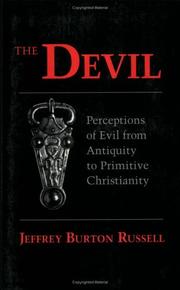
ISBN: 0801494095 Year: 1988 Publisher: Ithaca (N.Y.) : Cornell university press,
Abstract | Keywords | Export | Availability | Bookmark
 Loading...
Loading...Choose an application
- Reference Manager
- EndNote
- RefWorks (Direct export to RefWorks)
Bien et mal --- Evil [Problem of ] --- Goed en kwaad --- Good and evil --- Kwaad [Probleem van het ] --- Mal [Problème du ] --- Probleem van het kwaad --- Problem of evil --- Problème du mal --- Devil --- History of doctrines

ISBN: 0826486827 Year: 2006 Volume: *7 Publisher: London Continuum
Abstract | Keywords | Export | Availability | Bookmark
 Loading...
Loading...Choose an application
- Reference Manager
- EndNote
- RefWorks (Direct export to RefWorks)
For thousands of years philosophers and theologians have grappled with the problem of evil. Traditionally, evil has been seen as a weakness of sorts: the evil person is either ignorant, or weak-willed. But in the most horrifying acts of evil, the perpetrators are resolute, deliberate, and well aware of the pain they are causing. Here David Roberts painstakingly details the matrix of issues that evolved into Kierkegaard's own solution. Kierkegaard's psychological understanding of evil is that it arises out of despair - a despair that can become so vehement and ferocious that it lashes out at ex
Kierkegaard, Søren --- Bien et mal --- Ethics --- Ethiek --- Ethique --- Evil [Problem of ] --- Goed en kwaad --- Good and evil --- Kwaad [Probleem van het ] --- Mal [Problème du ] --- Probleem van het kwaad --- Problem of evil --- Problème du mal --- Good and evil. --- Ethics. --- Kierkegaard, Søren, --- Kierkegaard, Søen. --- Philosophy & Religion --- Philosophy
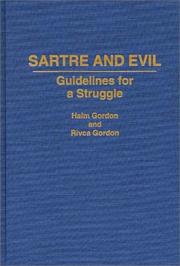
ISBN: 031327861X Year: 1995 Volume: vol. 54 Publisher: Westport, Conn. ; London Greenwood Press
Abstract | Keywords | Export | Availability | Bookmark
 Loading...
Loading...Choose an application
- Reference Manager
- EndNote
- RefWorks (Direct export to RefWorks)
Bien et mal --- Evil [Problem of ] --- Goed en kwaad --- Good and evil --- Kwaad [Probleem van het ] --- Mal [Problème du ] --- Probleem van het kwaad --- Problem of evil --- Problème du mal --- Sartre, Jean-Paul --- Sartre, Jean Paul, - 1905- - Views on good and evil.
Book
ISBN: 0715627082 Year: 1996 Publisher: London Duckworth
Abstract | Keywords | Export | Availability | Bookmark
 Loading...
Loading...Choose an application
- Reference Manager
- EndNote
- RefWorks (Direct export to RefWorks)
Bien et mal --- Evil [Problem of ] --- Goed en kwaad --- Good and evil --- Kwaad [Probleem van het ] --- Mal [Problème du ] --- Probleem van het kwaad --- Problem of evil --- Problème du mal --- 235.2 --- Kwade engelen. Demonen. Demonologie. Duivel. Satan. Lucifer. Asmodeus. Beëlzebub. Mephistoteles --- 235.2 Kwade engelen. Demonen. Demonologie. Duivel. Satan. Lucifer. Asmodeus. Beëlzebub. Mephistoteles
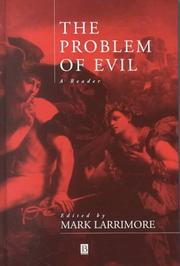
ISBN: 0631220143 Year: 2001 Publisher: Oxford : Blackwell,
Abstract | Keywords | Export | Availability | Bookmark
 Loading...
Loading...Choose an application
- Reference Manager
- EndNote
- RefWorks (Direct export to RefWorks)
Bien et mal --- Evil [Problem of ] --- God--Permissive will --- God--Will Permissive --- Goed en kwaad --- Good and evil --- Kwaad [Probleem van het ] --- Mal [Problème du ] --- Permissive will of God --- Probleem van het kwaad --- Problem of evil --- Problème du mal --- Theodicee --- Theodicy --- Théodicée --- Theodicy. --- Religious aspects.
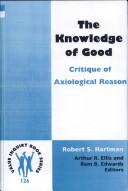
ISBN: 904201220X 9004496106 Year: 2021 Volume: 126 Publisher: Brill
Abstract | Keywords | Export | Availability | Bookmark
 Loading...
Loading...Choose an application
- Reference Manager
- EndNote
- RefWorks (Direct export to RefWorks)
This book presents Robert S. Hartman’s formal theory of value and critically examines many other twentieth century value theorists in its light, including A.J. Ayer, Kurt Baier, Brand Blanshard, Paul Edwards, Albert Einstein, William K. Frankena, R.M. Hare, Nicolai Hartmann, Martin Heidegger, G.E. Moore, P.H. Nowell-Smith, Jose Ortega y Gasset, Charles Stevenson, Paul W. Taylor, Stephen E. Toulmin, and J.O. Urmson.
Bien et mal --- Evil [Problem of ] --- Goed en kwaad --- Good and evil --- Kwaad [Probleem van het ] --- Mal [Problème du ] --- Probleem van het kwaad --- Problem of evil --- Problème du mal --- Valeurs (Philosophie) --- Values --- Waarden (Filosofie) --- Values. --- Axiology --- Worth --- Aesthetics --- Knowledge, Theory of --- Metaphysics --- Psychology --- Ethics --- Philosophy --- 19th & 20th Century Philosophy --- Ethics & Moral Philosophy

ISBN: 081269175X Year: 1994 Publisher: Chicago (Ill.): Open Court
Abstract | Keywords | Export | Availability | Bookmark
 Loading...
Loading...Choose an application
- Reference Manager
- EndNote
- RefWorks (Direct export to RefWorks)
Bien et mal --- Evil [Problem of ] --- Goed en kwaad --- Good and evil --- Kwaad [Probleem van het ] --- Mal [Problème du ] --- Probleem van het kwaad --- Problem of evil --- Problème du mal --- 216.5 --- Goed en kwaad: lijden --- Evolution --- Good and evil. --- Moral and ethical aspects. --- 216.5 Goed en kwaad: lijden --- Evil --- Wickedness --- Ethics --- Philosophy --- Polarity --- Religious thought --- Creation --- Emergence (Philosophy) --- Teleology --- Moral and ethical aspects --- Evolution - Moral and ethical aspects.
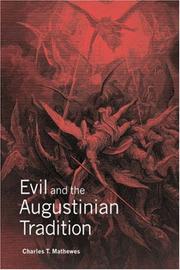
ISBN: 0521807158 0521035449 1107124433 0511174292 051104187X 0511154054 0511325185 0511487789 1280419245 0511044372 9780521807159 9780511041877 9780511487781 9780511044373 9781107124431 9781280419249 9780511174292 9780511154058 9780511325182 Year: 2001 Publisher: Cambridge Cambridge University press
Abstract | Keywords | Export | Availability | Bookmark
 Loading...
Loading...Choose an application
- Reference Manager
- EndNote
- RefWorks (Direct export to RefWorks)
This explores the 'family biography' of the Augustinian tradition by looking at Augustine's work and its development in the writings of Hannah Arendt and Reinhold Niebuhr. Mathewes argues that the Augustinian tradition offers us a powerful, though commonly misconstrued, proposal for understanding and responding to evil's challenges. The book casts light on Augustine, Niebuhr and Arendt, as well as on the problem of evil, the nature of tradition, and the role of theological and ethical discourse in contemporary thought.
Good and evil. --- Bien et mal --- Evil [Problem of ] --- Goed en kwaad --- Good and evil --- Kwaad [Probleem van het ] --- Mal [Problème du ] --- Probleem van het kwaad --- Problem of evil --- Problème du mal --- 276 =71 AUGUSTINUS:241 --- #GOSA:II.P.AU.3 --- #GOSA:II.P.AU.4 --- Evil --- Wickedness --- Ethics --- Philosophy --- Polarity --- Religious thought --- Evil in motion pictures --- Latijnse patrologie-:-Moraaltheologie. Theologische ethiek--AUGUSTINUS --- Augustine Saint, Bishop of Hippo --- Augustine, --- Avgustin, Blazhennyĭ, --- Augustinus, Aurelius, --- Augustyn, --- Augustin, --- Ughasṭīnūs, --- Agostino, --- Agustí, --- Augoustinos, --- Aurelius Augustinus, --- Augustinus, --- Agustín, --- Aurelio Agostino, --- Episkopos Ippōnos Augoustinos, --- Augoustinos Ipponos, --- Agostinho, --- Aurelli Augustini, --- Augustini, Aurelli, --- Aurelii Augustini, --- Augustini, Aurelii, --- Ōgostinos, --- Agostino, Aurelio, --- אוגוסטינוס הקדוש --- أغسطينوس، --- 奥古斯丁 --- Augustine --- Avgustin, --- Augustinus, Aurelius --- Agostinho --- Augustine of Hippo --- Augustine d'Hippone --- Agostino d'Ippona --- Augustin d'Hippone --- Augustinus Hipponensis, sanctus --- Sant'Agostino --- Augustinus van Hippo --- Aurelius Augustinus --- Aurelio Agostino --- 聖アウグスティヌス --- アウグスティヌス --- Arts and Humanities --- Religion
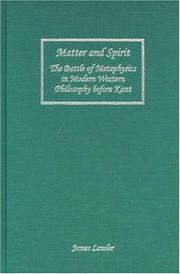
ISBN: 1580462219 9786611741266 1281741264 158046663X Year: 2006 Publisher: Rochester, NY : University of Rochester Press,
Abstract | Keywords | Export | Availability | Bookmark
 Loading...
Loading...Choose an application
- Reference Manager
- EndNote
- RefWorks (Direct export to RefWorks)
This narrative shows how the contours of moral and political philosophy in the seventeenth and eighteenth centuries were shaped by Kant's two distinct philosophical responses to the results of modern science. This history of early modern Western philosophy takes its inspiration from Kant's claim that the battle between the metaphysics of matter and that of spirit is the principal axis around which modern philosophy up to his time, in all its aspects, has revolved. The empiricist-materialist trend that dominates in England is first examined in the progressively unfolding works of Hobbes, Locke, Berkeley, Hume, and Adam Smith. A contrasting and competing dialectic develops in the rationalist/spiritualist trend in the continental philosophy of Descartes, Leibniz, and Rousseau. Framing this history is the background context of the philosophy and science of Aristotle and the challenges to the traditional paradigm presented by the revolutionary sciences of Copernicus, Galileo, and Newton. James Lawler is Professor of Philosophy at the State University of New York at Buffalo.
metaphysique --- Metaphysique --- 18e s. --- Contribution à la métaphysique --- Et la métaphysique --- Philosophie première --- Cosmologie --- Absence et présence --- Absolu --- Accident (philosophie) --- Acte (métaphysique) --- Agent (philosophie) --- Aléatoire --- Allégorie de la caverne --- Altérité (philosophie) --- Âme --- Analogie (philosophie) --- Anomalie (philosophie) --- Apparence (philosophie) --- Attribut (philosophie) --- Bien (philosophie) --- Catégories (philosophie) --- Causalité --- Changement (philosophie) --- Chose (philosophie) --- Chose en soi --- Cogito --- Compensation (philosophie) --- Complexité (philosophie) --- Contingence --- Continu (philosophie) --- Convenance (philosophie) --- Crise (philosophie) --- Déterminisme (philosophie) --- Dieu --- Différence (philosophie) --- Disposition (philosophie) --- Donation (philosophie) --- Dualisme (philosophie) --- Entités (philosophie) --- Espace (philosophie) --- Esprit --- Esprit et corps --- Essence (philosophie) --- Éternel retour --- Éternité (philosophie) --- Événement (philosophie) --- Existence (philosophie) --- Expression (philosophie) --- Finalité --- Fini (philosophie) --- Forme (philosophie) --- Hasard --- Hylémorphisme --- Hypostase (philosophie) --- Idéalisme (philosophie) --- Idée (philosophie) --- Identité (philosophie) --- Immanence (philosophie) --- Immatérialisme --- Impetus (philosophie) --- Individu (métaphysique) --- Infini --- Intellect (philosophie) --- Limite (philosophie) --- Logos (philosophie) --- Loi (philosophie) --- Matérialisme --- Matière --- Microcosme et macrocosme --- Mode (philosophie) --- Monade (philosophie) --- Monde (philosophie) --- Monisme --- Mouvement (philosophie) --- Multiple (philosophie) --- Naturalisme (philosophie) --- Néant (philosophie) --- Nécessité --- Nihilisme (philosophie) --- Nominalisme --- Norme (philosophie) --- Nouveauté --- Objet (philosophie) --- Occasion (philosophie) --- Ontologie --- Optimisme --- Ordre (philosophie) --- Origine (philosophie) --- Participation (philosophie) --- Perfection --- Pessimisme --- Phénomène (philosophie) --- Pluralisme (philosophie) --- Possibilité --- Principe (philosophie) --- Principe d'économie (philosophie) --- Principe de raison suffisante --- Problème du mal --- Puissance (métaphysique) --- Pureté (philosophie) --- Réalisme (philosophie) --- Réalité --- Réification --- Répétition (philosophie) --- Simplicité (philosophie) --- Situation (philosophie) --- Soi (philosophie) --- Spiritualisme --- Substance (philosophie) --- Sujet (philosophie) --- Système (philosophie) --- Temps (philosophie) --- Théodicée --- Totalité (philosophie) --- Transcendance (philosophie) --- Transcendantaux --- Triade (philosophie) --- Un (philosophie) --- Universaux (philosophie) --- Universel (philosophie) --- Virtualité (philosophie) --- Weltanschauung --- Philosophie --- Aristotle. --- Copernicus. --- Empiricist-Materialist. --- Galileo. --- Kant. --- Metaphysics. --- Newton. --- Rationalist-Spiritualist. --- Western Philosophy.
| Listing 1 - 9 of 9 |
Sort by
|

 Search
Search Feedback
Feedback About UniCat
About UniCat  Help
Help News
News